Who is going to vote for Javier Milei in Argentina?
Ahead of Sunday’s vote, the far-right candidate has garnered support from all ages and social classes, although his most active followers are young men

The voter profile for Javier Milei, the leading candidate for the Argentine presidency, is very diverse. While his electoral base is made up of young men — the first group that began to follow him on social media — in recent months, support for the far-right candidate has grown and extended to voters from all age groups and social classes.
EL PAÍS has spoken with some of the people who are planning on voting for La Libertad Avanza (Liberty Advances) — Milei’s coalition — including workers who don’t have formal employment, small merchants who criticize the high taxes they are required to pay, professionals who telework to find clients abroad, as well as parents and grandparents, who are worried about the future of their children and grandchildren, growing insecurity and corruption. All of them have been hit by skyrocketing inflation.
Milei — who is leading the polls for the first round of the presidential elections on Sunday — has voters in the capital of Buenos Aires and its extensive metropolitan area, as well as support in the most remote provinces. Here are some of the people who plan on casting their ballot for him on October 22.
Facundo Sastre, student, 18-years-old: ‘I like Milei because he’s very honest and has plans for the future’
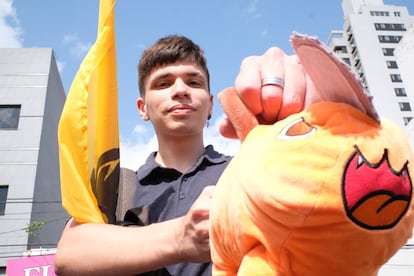
Facundo Sastre studies systems engineering at the National Technological University in Buenos Aires. He met Milei — an economist by profession — when he was in high school. He then began following him on social media and talking about him to his family.
“At first, my dad didn’t really like [Milei] because of the way he spoke, but after a while, he listened to him more carefully and liked his ideas,” says Sastre, who lives in Lomas de Zamora, a city just south of the capital. “I notice that he’s very honest — not like the other [candidates] — and he has plans for the future, he gives clear examples of what he’s going to do,” Sastre continues.
The proposal made by the far-right candidate that most excites this teenager has to do with education: “I love the voucher system… I think it’s very good.” According to Milei’s proposed system, schools and universities would charge fees, while students would receive checks from the state. They could then use these amounts to decide whether they wanted to attend “state-run or private” institutions.
Augusto Montamat, merchant, 28-years-old: ‘It should be embarrassing to call yourself a leftist’
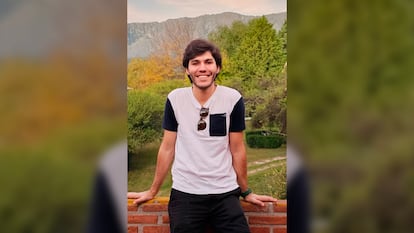
Augusto Montamat began his political career as part of the youth wing of Together for Change — the center-right coalition — in the province of Córdoba, in central Argentina. He had just left school and anti-Kirchnerist discourse (the Kirchner couple governed the country from 2003 until 2015) pushed him into the ranks of the alliance created by businessman Mauricio Macri. Macri governed between 2015 and 2019, before losing his re-election bid. Disenchanted with the movement, Montamat distanced himself, but he still kept in touch with some people he met there, such as the far-right writer Agustín Laje, who introduced him to Milei.
Since 2018, Montamat has supported the controversial economist. “I’m right-wing, and I work [so that this political] concept is accepted,” explains the man from Córdoba. “It should be embarrassing to call yourself a leftist,” he adds.
A merchant by profession, Montamat created a foundation during the pandemic to support community kitchens and assist poor children. This past week, he traveled 400 miles to be present at Milei’s closing rally in Buenos Aires. If he had to define himself, he would say that he’s an enemy of the state, a defender of “life from the moment of conception” and a follower of “Christian values.”
María del Carmen Moraga — unemployed, 48-years-old — and her 14-year-old: ‘I only want my daughter to leave the country if it’s for pleasure’
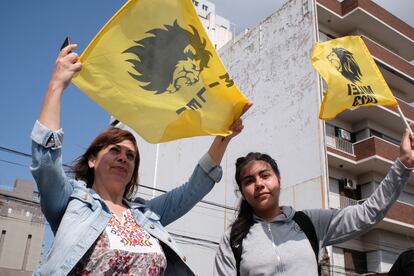
María del Carmen Moraga decided to vote for Milei when her daughter told her that, when she finished high school, she was going to leave Argentina to try her luck abroad. “I think Milei represents an option for her to think twice [before emigrating],” she sighs. “If my daughter leaves the country, I want it to be for pleasure, so that she can get to know other cultures.”
This woman — now unemployed — is afraid of the similarity between the policies proposed by the far-right candidate and those of former president Carlos Menem (1989-1999), who came to power when she was a teenager. “I had a very hard time; it was the worst thing I had to experience. At the age of 14, I started working so that I could bring food to my house. Since there was no money, my employer could only pay me with food,” she recalls.
Even so, she believes that, this time around, things will be different. She settled on the far-right candidate after having given opportunities to other politicians. She feels that all the other parties failed her. A resident of the western outskirts of Buenos Aires, Moraga believes that the main concern in this election is insecurity. “In economic matters, we’re a country of ups and downs… but due to insecurity, in just one week, I had two robberies,” she laments.
Gonzalo, computer programmer, 41-years-old: ‘If my clients abroad pay me here, I lose money with the exchange rate’
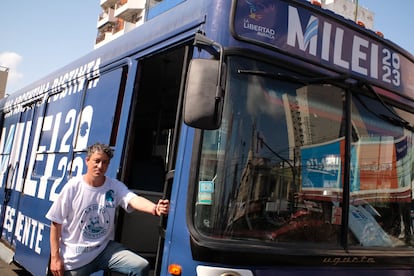
Gonzalo wants Javier Milei to win so that taxes can be cut. He believes that this will boost an economy that has been stagnant for the past 12 years. “Look around, there are so many businesses being closed because they don’t report [income]. You want to open a business and you have to pay fees to the municipality, the [provincial government], salaries, advertising… you can’t manage like this,” says the computer programmer, who lives in a suburb 12 miles away from Buenos Aires.
Gonzalo also criticizes the obstacles that the state places in the path of entrepreneurs like him. “I have clients abroad, but they deposit dollars in [my] external account, because if they pay me here, it gets converted to pesos at the official rate — which is 370 pesos [per dollar] — instead of the black-market rate, which is closer to 1,000 pesos. That’s the way things are here,” he sighs.
Active in the left-wing Peronist movement in his youth, today, Gonzalo thinks that he participated because of “generational reasons.” He now supports Milei.
Alicia, nurse, 66-years-old: ‘I like Milei because he’s not a politician’
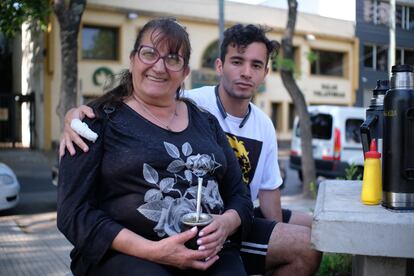
Alicia, who prefers not to give her last name, was born in Uruguay 66 years ago. She became an Argentine citizen by choice. “I studied here, I worked here, and I retired here.” She says that, during her 35 years as a nurse in public hospitals, she saw the progressive deterioration of healthcare, the underappreciation of doctors and nurses, increasingly lower salaries and how the best medical professionals “go to the private sector.”
Alicia regrets that, in Argentina, “everything is politicized.” She says that this is why — despite possessing Argentine nationality — she never bothered to vote. This October 22 will be the first time she casts a ballot in her adopted country. “I always said I was apolitical and I never voted because I didn’t trust anyone. But now I like Milei’s proposal, because he’s not a politician,” she explains. Alicia believes that many people are scared of because of the way he talks — “he seems crazy” — but she argues that he’s an economist with lots of experience.
“At least he’s someone who isn’t known, because of all the [candidates] we’re familiar with, none of them are worth it,” she emphasizes.
Ruth Vacca, merchant, 54-years-old: ‘There’s hope in the air, I’ve wanted to feel it for a long time’
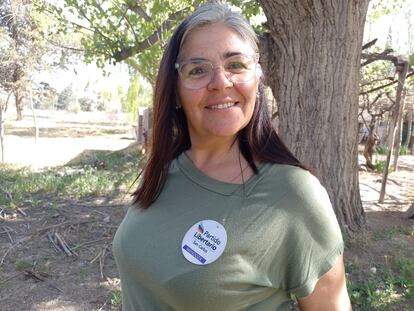
Ruth Vacca grew up in an anti-leftist family in the western province of Mendoza. However, she didn’t get involved in politics until last year, when she began attending meetings where the ideas of Javier Milei were being discussed. The extreme candidate charmed her, she admits.
“There’s hope in the air, I’ve wanted to feel it for a long time. He’s going to be able to bring change… We’re going to have to help him a lot,” says Vacca. She’s been distributing leaflets on Milei’s behalf and, on Sunday, she will be one of his scrutineers.
Vacca summarizes why she’s voting for Milei with an example from her life: “I live in the countryside and there’s only a [small clinic]. You can only get sick from 7:30 a.m. to 1:00 p.m., which is when the nurse comes. It’s a nightmare. We depend on the state and the state is managing our money poorly,” she explains.
In her district, she affirms, Milei got 55% of the votes in the August primary elections. She hopes that this victory will be repeated on Sunday. “No one wants [the leftist candidate Sergio] Massa here; [Patricia] Bullrich [of the center-right Together for Change coalition] came to town for 10 minutes. She spent the whole time speaking against Milei. People are tired.”
Sign up for our weekly newsletter to get more English-language news coverage from EL PAÍS USA Edition
Tu suscripción se está usando en otro dispositivo
¿Quieres añadir otro usuario a tu suscripción?
Si continúas leyendo en este dispositivo, no se podrá leer en el otro.
FlechaTu suscripción se está usando en otro dispositivo y solo puedes acceder a EL PAÍS desde un dispositivo a la vez.
Si quieres compartir tu cuenta, cambia tu suscripción a la modalidad Premium, así podrás añadir otro usuario. Cada uno accederá con su propia cuenta de email, lo que os permitirá personalizar vuestra experiencia en EL PAÍS.
¿Tienes una suscripción de empresa? Accede aquí para contratar más cuentas.
En el caso de no saber quién está usando tu cuenta, te recomendamos cambiar tu contraseña aquí.
Si decides continuar compartiendo tu cuenta, este mensaje se mostrará en tu dispositivo y en el de la otra persona que está usando tu cuenta de forma indefinida, afectando a tu experiencia de lectura. Puedes consultar aquí los términos y condiciones de la suscripción digital.








































